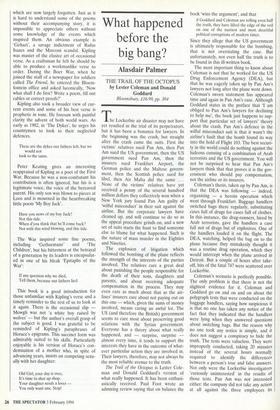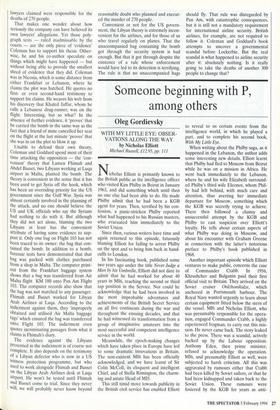What happened before the big bang?
Alasdair Palmer
THE TRAIL OF THE OCTOPUS by Lester Coleman and Donald Goddard Bloomsbury, 116.99, pp. 304 Tie Lockerbie air disaster may not have yet resulted in the trial of its perpetrators, but it has been a bonanza for lawyers. In the beginning was the crash, but straight after the crash came the suits. First the victims' relatives sued Pan Am, then Pan Am sued the US government, then the US government sued Pan Am, then the insurers sued Frankfurt Airport, the German police and the Maltese govern- ment, then the Scottish police sued for libel, then Air Malta did the same . . . None of the victims' relatives have yet received a penny of the several hundred million dollars they collectively won when a New York jury found Pan Am guilty of `wilful misconduct' in their suit against the airline. But the corporate lawyers have cleaned up, and will continue to do so as the appeal procedure grinds on, and a new set of suits starts the hunt to find someone else to blame for what happened. Such is the nature of mass murder in the Eighties and Nineties.
The explosion of litigation which followed the bombing of the plane reflects the strength of the interests of the parties involved. The relatives care a great deal about punishing the people responsible for the death of their sons, daughters and parents, and about receiving adequate compensation in the process. They may even care as much about that as the air- lines' insurers care about not paying out on this one — which, given the sums of money involved, means caring an awful lot. The US (and therefore the British) government seems to care most about preserving good relations with the Syrian government. Everyone has a theory about what really happened, and — surprise, surprise almost every time, it tends to support the interests they have in the outcome of what- ever particular action they are involved in. Their lawyers, therefore, may not always be the most reliable avenue to the truth.
The Trail of the Octopus is Lester Cole. man and Donald Goddard's version of what really happened. It has been enthusi- astically received. Paul Foot wrote an admiring review saying that on balance the
book 'wins the argument', and that if Goddard and Coleman are telling even half the truth, they have lifted the edge of the veil on one of the nastiest and most. deceitful political corruptions of modern times.
Since they allege that the US government is ultimately responsible for the bombing, that is not overstating the case. But unfortunately, not even half the truth is to be found in this ill-written book.
The most important thing to know about Coleman is not that he worked for the US Drug Enforcement Agency (DEA), but that he was eagerly taken up by Pan Am's lawyers not long after the plane went down.
Coleman's sworn statement has appeared time and again in Pan Am's case. Although Goddard states in the preface that 'I am obliged to Pan Am's lawyers for declining to help me', the book just happens to sup- port that particular set of lawyers' theory about the crash. Pan Am's defence in the wilful misconduct suit is that it wasn't the airline's fault that the bomb found its way into the hold of Flight 103. The best securi- ty in the world could do nothing against the hideous cunning of a combination of Arab terrorists and the US government. You will not be surprised to hear that Pan Am's lawyers think that that proves it is the gov- ernment who should pay compensation, not the airline or its insurers.
Coleman's thesis, taken up by Pan Am, is that the DEA was following — indeed, organising — a heroin operation which went through Frankfurt. Baggage handlers switched bags there regularly, substituting cases full of drugs for cases full of clothes.
In this instance, the drug-runners, hired by Arab terrorists, gave the handlers a case full not of drugs but of explosives. One of the handlers loaded it on the flight. The DEA, watching, helped the bag on to the plane because they mistakenly thought it was a routine drug operation, which they would intercept when the plane arrived in Detroit. But a couple of hours after take- off, bits of the fatal 747 were scattered over Lockerbie.
Coleman's scenario is perfectly possible. The only problem is that there is not the slightest evidence for it. Coleman and Goddard go on and on and on about the polygraph tests that were conducted on the baggage handlers, saying how suspicious it is that no one has taken any notice of the fact that they indicated that the handlers were lying when they answered questions about switching bags. But the reason why no one took any notice is simple, and it does not suggest a conspiracy to hide the truth. The tests were valueless. They were improperly conducted, taking 20 minutes instead of the several hours normally required to identify the differences between a person's true and false answers.
Not only were the Lockerbie investigators `curiously uninterested' in the results of those tests. Pan Am was not interested either: the company did not take any action at all against the three employees its lawyers claimed were responsible for the deaths of 270 people.
That makes one wonder about how seriously the company can have believed its own lawyers' allegations. Yet those poly- graph tests — ruled inadmissable by the courts — are the only piece of 'evidence' Coleman has to support his thesis. Other- wise, he and his co-author speculate on things which might have happened — but without being able to provide the smallest shred of evidence that they did. Coleman was in Nicosia, which is some distance from either Frankfurt or Lebanon, where he claims the plot was hatched. He quotes no first- or even second-hand testimony to support his claims. He weaves his web from his discovery that Khaled Jaffar, whom he calls a Lebanese drug-runner, was on the flight. Interesting, but so what? In the absence of further evidence, it 'proves' that he carried the bomb in the same way as the fact that a friend of mine cancelled her seat on the flight at the last minute 'proves' that she was in on the plot to blow it up.
Unable to defend their own theory, Coleman and Goddard spend most of their time attacking the opposition — the 'con- venient' theory that Lamen Fhimah and Abdel Basset, two Libyans working at Luqa airport in Malta, planted the bomb. The theory is convenient in the sense that it has been used to get Syria off the hook, which has been an overriding priority for the US government since the Gulf War. Syria was almost certainly involved in the planning of the attack, and no one should believe the US and UK officials who say the Syrians had nothing to do with it. But although they did not act alone, blaming the two Libyans at least has the convenient attribute of having some evidence to sup- port it. Only one bag on Flight 103 has not been traced to its owner: the bag that con- tained the bomb. In addition to a bomb, forensic tests have demonstrated that that bag was packed with clothes purchased from a shop in Malta. The computer print- out from the Frankfurt baggage system shows that a bag was transferred from Air Malta flight KM 180 onto Pan Am Flight 103. The computer records also show that the bag was not matched to any passenger. Fhimah and Basset worked for Libyan Arab Airlines at Luqa. According to the indictment against them, they 'improperly obtained and utilised Air Malta baggage tags' which ensured the bag was transferred onto Flight 103. The indictment even quotes incriminating passages from what it claims is Fhimah's diary.
The evidence against the Libyans presented in the indictment is of course not Complete. It also depends on the testimony of a Libyan defector who is now in a US witness protection programme, but who used to work alongside Fhimah and Basset on the Libyan Arab Airlines desk at Luqa airport. He won't be tested until Fhimah and Basset come to trial. Since they never Will, we will probably never know beyond reasonable doubt who planned and execut- ed the murder of 270 people.
Convenient or not for the US govern- ment, the Libyan theory is extremely incon- venient for the airlines, and for those of us who travel regularly on planes. That the unaccompanied bag containing the bomb got through the security system is bad enough. But that it got through despite the existence of a rule whose enforcement would have led to its detection is terrifying. The rule is that no unaccompanied bags should fly. That rule was disregarded by Pan Am, with catastrophic consequences, but it is still not a mandatory requirement for international airline security. British airlines, for example, are not required to follow it. Coleman and Goddard's book attempts to uncover a governmental scandal before Lockerbie. But the real scandal is what happened to airline security after it: absolutely nothing. Is it really going to take the deaths of another 300 people to change that?



















































 Previous page
Previous page